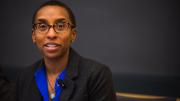Last Friday, the Faculty of Arts and Sciences’ (FAS) social science division marked the launch of its Inequality in America Initiative at a day-long symposium in Loeb House. The initiative is designed to strengthen the University’s work on economic, political, and social inequality across disciplines. “Harvard, certainly in FAS but also as you look across the schools, has this incredible collection of scholars engaged on these questions,” social science dean Claudine Gay said in an interview last week. “We have people who are looking at inequality across race, gender, and class, but also thinking about the different domains of inequality—education, health, the labor market. We have all this on campus, but they’re not always in conversation...The idea here is to pursue a strategy that’s focused on greater collaboration, some new investment, and more dialogue.”
To those ends, the initiative consists of conversations among researchers from five thematic research clusters: American inequality, globally (covering the paradox of America’s ideology of equality and its history of exploitation); governance, citizenship, and social justice; mobility and migration; science, technology, education, and health; and work, family, and opportunity. The initiative also includes funding for a two-year postdoctoral program for scholars working on inequality, to launch next fall, and annual symposia. The first of those took place on Friday, bringing together economists, political scientists, legal theorists, and others from across several institutions. Princeton economist Alan Krueger, Ph.D. ’87, spoke about the manipulation of labor markets by employers through structures like non-compete clauses, or outright collusion; University of Michigan economist Betsey Stevenson, Ph.D. ’01, spoke about the inflexibility of the American workplace relative to changes in family structure. “We’re still in a time period where the workplace is imagining that we have some person who’s at home managing our lives,” she said. “Men and women both increasingly say that they have work-family conflict. It’s not that they’re saying their family is interfering with work; it’s that their work is interfering with their family.”
FAS dean Michael D. Smith “had resources to invest in a small handful of academic initiatives in each division, and this is what he wanted to invest in in the social sciences,” Gay explained during the interview. “My ambitions for the initiative greatly exceed the resources that we have in place now...We have a slate of academic ideas that we eventually want to see in steady state, and we’re going to scale them up over time while raising money to support them.”
The terms of the national discussion of inequality are not always clear; most economists believe society needs some level of inequality, or there would be no incentive to do anything. What does it mean, then, to talk about a national crisis of inequality? Gay pointed to a few things:
Most inequality is actually inherited...what we’re talking about here is persistent inequalities that go across generations and completely eliminate opportunity for new generations. Another thing is that inequality is a problem that doesn’t have clear edges. If you listen to the public discourse, inequality is just about the gap between the rich and the poor, and that CEOs make 300 to 400 times more than the average worker. It’s not that that’s not important, but that’s just a tiny sliver of inequality. The public discourse is consumed by those kinds of facts. But inequality also includes things like the fact that black kids are three times more likely than white kids to go to a school where less than 60 percent of teachers are fully certified and licensed...that something like 15 percent of individuals in the U.S. live in female-headed households, but female-headed households account for 43 percent of the chronically poor. In some way the gap between the rich and poor is a motivator for people...but it’s a much more complex landscape that people at Harvard are working on.
A foundational question to the study of inequality is whether broadly shared prosperity and a robust safety net can be compatible with a racially and culturally diverse society. “One of the things that can undermine support for social-welfare programs is racialization of those programs,” Gay said. “Programs that are ostensibly non-racial can be framed in racial terms. That can be done by the language that’s used, the symbols that are used, and the tendency to emphasize particularly types of beneficiaries of the program. That has the effect of reducing public support for those programs, especially for white Americans.”
Walter Johnson, Winthrop professor of history and of African and African American studies, also noted, in the FAS annual report’s introduction of the initiative: “It seems to me that an aspect of this should be a self-reflection on Harvard, how it can do better in relation to the communities it inhabits, and all the ways in which the University is an actor in an unequal economy.” Gay echoed his remarks: “We are an elite institution, and there are ways in which we contribute to the reproduction of inequality...The more we try to broaden the pool of students we draw from, by bringing in more low-income and first-generation students, we more assertively become part of the solution. I think there’s deep commitment in the University at all levels to doing that, to positioning ourselves as part of the solution, but it’s also the case that we educate the top 5 percent.”









